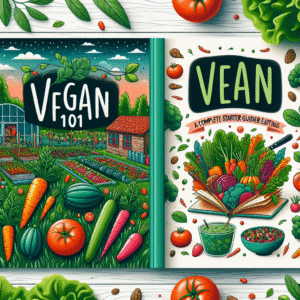The journey into veganism can be an enriching experience, filled with numerous health benefits, a lower environmental impact, and ethical considerations regarding animal welfare. However, transitioning to a vegan lifestyle can seem daunting if you’re unsure where to start. This guide aims to provide you with essential information on adopting a healthy vegan diet.
Understanding Veganism
Veganism is more than just a diet; it is a philosophy and lifestyle that seeks to eliminate all forms of animal exploitation and cruelty. A vegan diet excludes all animal products, including meat, dairy, eggs, and honey. Instead, the focus is on consuming plant-based foods such as fruits, vegetables, grains, legumes, nuts, and seeds.
Health Benefits of a Vegan Diet
A well-planned vegan diet can offer numerous health benefits:
- Improved Heart Health: A diet rich in fruits and vegetables can lower blood pressure and cholesterol levels.
- Weight Management: Vegans often have lower body mass indexes (BMIs) and can maintain a healthy weight more easily.
- Reduced Risk of Chronic Diseases: Plant-based diets are associated with lower risks of Type 2 diabetes, certain cancers, and heart disease.
Essentials of a Vegan Diet
To ensure you are receiving all the vital nutrients, it’s important to include a variety of foods in your diet. Here are some essential components of a well-rounded vegan diet:
Fruits and Vegetables
These should form the cornerstone of your meals. Aim for a rainbow of colors to ensure a wide range of nutrients.
Grains
Whole grains such as brown rice, quinoa, oats, and whole grain bread are great sources of energy and should be integrated into every meal.
Legumes
Beans, lentils, and chickpeas are excellent protein sources and rich in fiber. Incorporating them can provide satiety and essential nutrients.
Nuts and Seeds
These provide healthy fats, protein, and various vitamins and minerals. Be sure to include walnuts, chia seeds, flaxseeds, and almonds in your diet.
Plant-Based Proteins
To ensure adequate protein intake, consider incorporating plant-based protein sources such as tofu, tempeh, seitan, and various protein-rich grains.
Vegan Meal Planning
Transitioning to a vegan diet can require some meal planning to ensure that you get a balance of all essential nutrients. Here are some tips for effective meal planning:
- Experiment with Recipes: Explore new plant-based recipes to keep meals exciting. There are many online resources and cookbooks dedicated to vegan cooking.
- Prep in Advance: Prepare meals in batches, such as soups, stews, or grain salads, to save time during the week.
- Variety is Key: Rotate different ingredients to prevent boredom and meet a broad spectrum of nutritional needs.
Common Nutritional Concerns
While a vegan diet can be very healthy, there are specific nutrients to pay particular attention to:
Vitamin B12
Vitamin B12 is crucial for nerve function and metabolism. Since it’s primarily found in animal products, vegans should consider fortified foods or supplements.
Iron
Password iron, found in legumes, nuts, and seeds, is more easily absorbed when combined with vitamin C-rich foods like bell peppers or citrus fruits.
Calcium
For healthy bones, look for fortified plant milk or consume leafy greens, almonds, and tofu.
Omega-3 Fatty Acids
Rich sources include flaxseeds, chia seeds, and walnuts. Consider taking an algae-based DHA supplement for additional support.
Vegan Substitutes
When transitioning to a vegan diet, you may find yourself missing certain foods. Luckily, there are plenty of substitutes available:
- Dairy: Plant-based milk (almond, soy, oat), nutritional yeast (for cheese flavor), and coconut yogurt.
- Meat: Tofu, tempeh, seitan, and jackfruit make excellent substitutes.
- Baking: Use applesauce, banana, or flaxseed meal as egg replacements in recipes.
Social Considerations
Adopting a vegan lifestyle may affect your social life, especially in social gatherings centered around food. Here are some tips:
- Be Prepared: Always bring a vegan dish to share.
- Communicate: Let your friends and family know about your dietary choices so they can accommodate you.
- Stay Confident: Stand firm in your choices, and don’t be afraid to advocate for your needs.
Conclusion
Transitioning to a vegan lifestyle can be both exciting and nourishing. By focusing on whole, plant-based foods and being mindful of your nutritional needs, you can reap the benefits of a healthy vegan diet. This journey not only promotes personal wellness but also contributes to a sustainable environment and ethical treatment of animals.
FAQs
1. Is it difficult to get enough protein on a vegan diet?
Not at all! There are many plant-based sources of protein, including lentils, beans, quinoa, tofu, and nuts, which can meet your daily requirements.
2. Can I lose weight on a vegan diet?
A vegan diet can aid in weight loss due to its focus on whole, nutrient-dense foods, although it still requires portion control and balanced meals.
3. Do I need to take supplements on a vegan diet?
While you can get most nutrients from a well-planned vegan diet, supplements for vitamin B12, and possibly vitamin D and omega-3s, may be necessary.
4. Are there any risks associated with a vegan diet?
Potential nutritional deficiencies can occur if the diet is not well-balanced. It’s essential to do comprehensive meal planning to avoid these risks.
5. Can children thrive on a vegan diet?
Yes, children can thrive on a well-planned vegan diet. However, it’s important to ensure they receive all essential nutrients for growth and development.


















